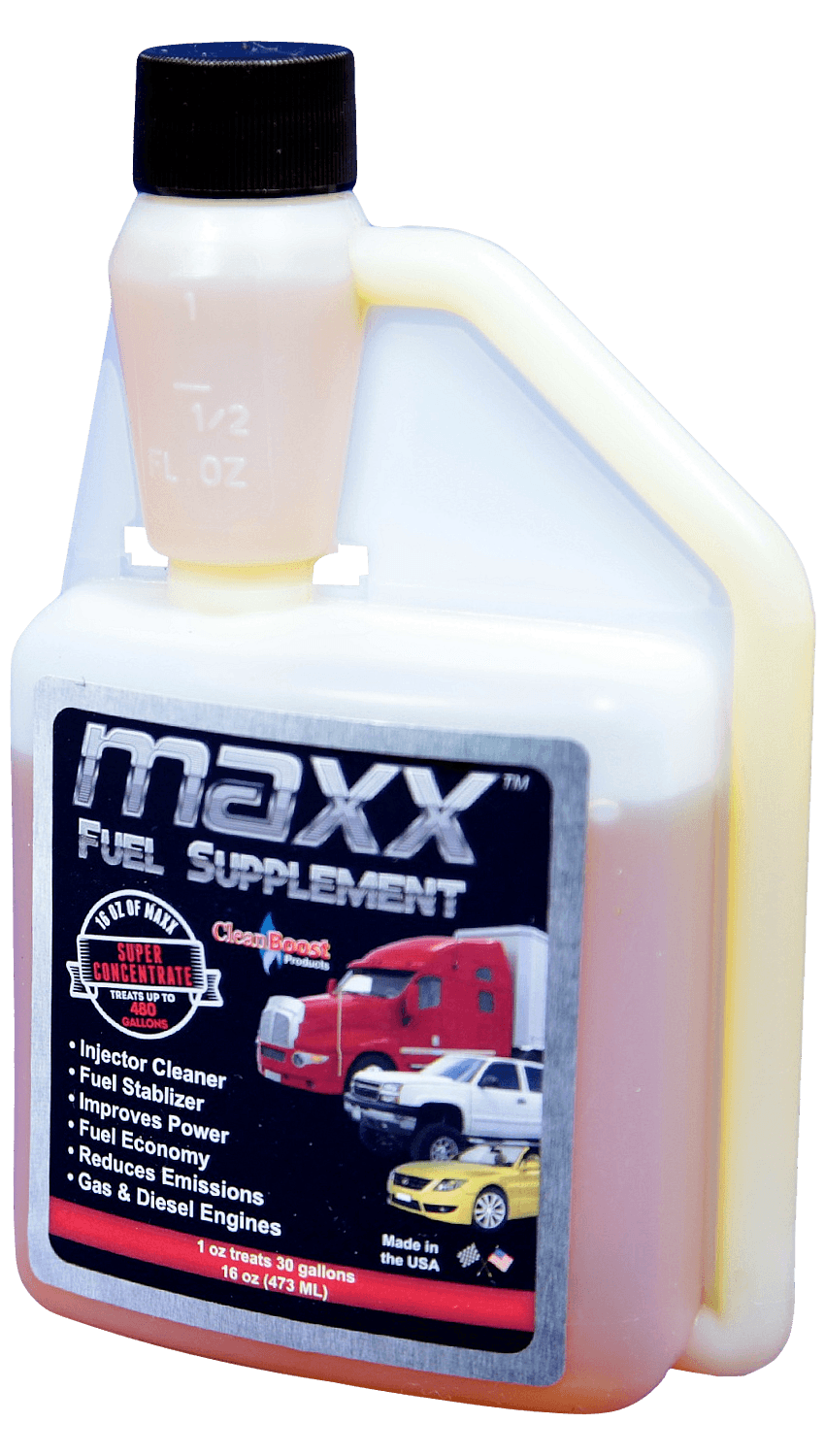5 Tips – How to Decrease Fuel Consumption
Fuel prices are always fluctuating... and your fuel budget is more generally a fixed cost that you try to maintain. This is a never ending, nerve racking roller coaster that happens every now and then and messes with your peace of mind. If only there were some ways to decrease fuel consumption...
If your budget does not cover buying a newer, more efficient car with significantly better mileage... what can you do?
Surely you've wondered how some of the people you know never seem to care or complain about fuel prices. As if they owned an oil rig. Ever wondered if perhaps they have access to a secret or know some tricks to decrease fuel consumption?
Truth is they do have some knowledge that can be applied easily. This would start reducing fuel consumption and render gas prices as less important news. Some of these tips you might have heard of. And others are solid logic & out in the open that you may ask how come you've never applied them?
Read on and you too will be able to learn these tips! Prepare to join the group that lives a more carefree car owner life. Fuel consumption drops can range from 3% up to 20% for each action you take. Might not sound like a lot but it adds up if you apply multiple tips to your ownership / driving experience.
Do you feel that your car burns more fuel than usual? The elements behind this can be wide and varied and some might be caused by the driver without intention. Let us enlist them here to unravel this mystery.
Uneven tire pressure:
Incorrect tire pressure leads to more forward resistance and thus a higher fuel consumption. Tire pressure varies for each car and can be found in the user manual, tire or on the door panel. If the pressure is under the recommended value, handling suffers and also fuel consumption increases. If the pressure is over the recommended value, fuel consumption will not be affected but the tires will wear unevenly.
Deposits on the oxygen sensor:
This sensor monitors the oxygen quantity in the exhaust gasses and sends this information to the PCM (Power Control Module). It does this so that it can adjust the air/fuel ratio that hits the combustion chambers. As the oxygen sensor gets more deposits, it starts to become inaccurate and indicate a lean mixture to the PCM. In exchange the PCM increases the gas ratio and the result will be a richer gas mixture in the engine. This rich mixture will not be entirely burned... but evacuated party unburned and produce an increases in overall fuel consumption .
Car not aerodynamic:
Roof top trunk, skis on the roof rack or bicycles are just a few items that should not be transported if not needed. Any item that modifies the original cars aerodynamics, creates an extra drag. This drag increases the engines effort to move the car forward. Open windows, AC and the sunroof fall into this category as well. Driving with the windows down instead of the AC on is recommended under 50 mph.
Over 50 mph, the AC is recommended or even better, if possible, to just turn on FRESH AIR to push cooler air into the car without turning the AC compressor on if possible.
Driving aggressively with a cold engine:
The engine needs 1-2 minutes to warm up after being started. After this time it's advised to drive it in a lower rpm range for ~2 miles until the engine reaches regular operating temperature. If driven aggressively when the engine is cold, a part of the air-gas mixture will not be burned. Therefore it will end up evacuated which increases fuel consumption.
Aggressive acceleration:
Nothing raises fuel consumption faster than a little sporty driving. The more easy you are on the throttle, the better your MPG will be. Best way to learn how much feathering the gas pedal influences the consumption is to check your car's instant consumption display while driving. On many vehicles, when you're good at this, you can even beat the cruise control with your own feathering vs. letting the cruise always maintain a certain speed.
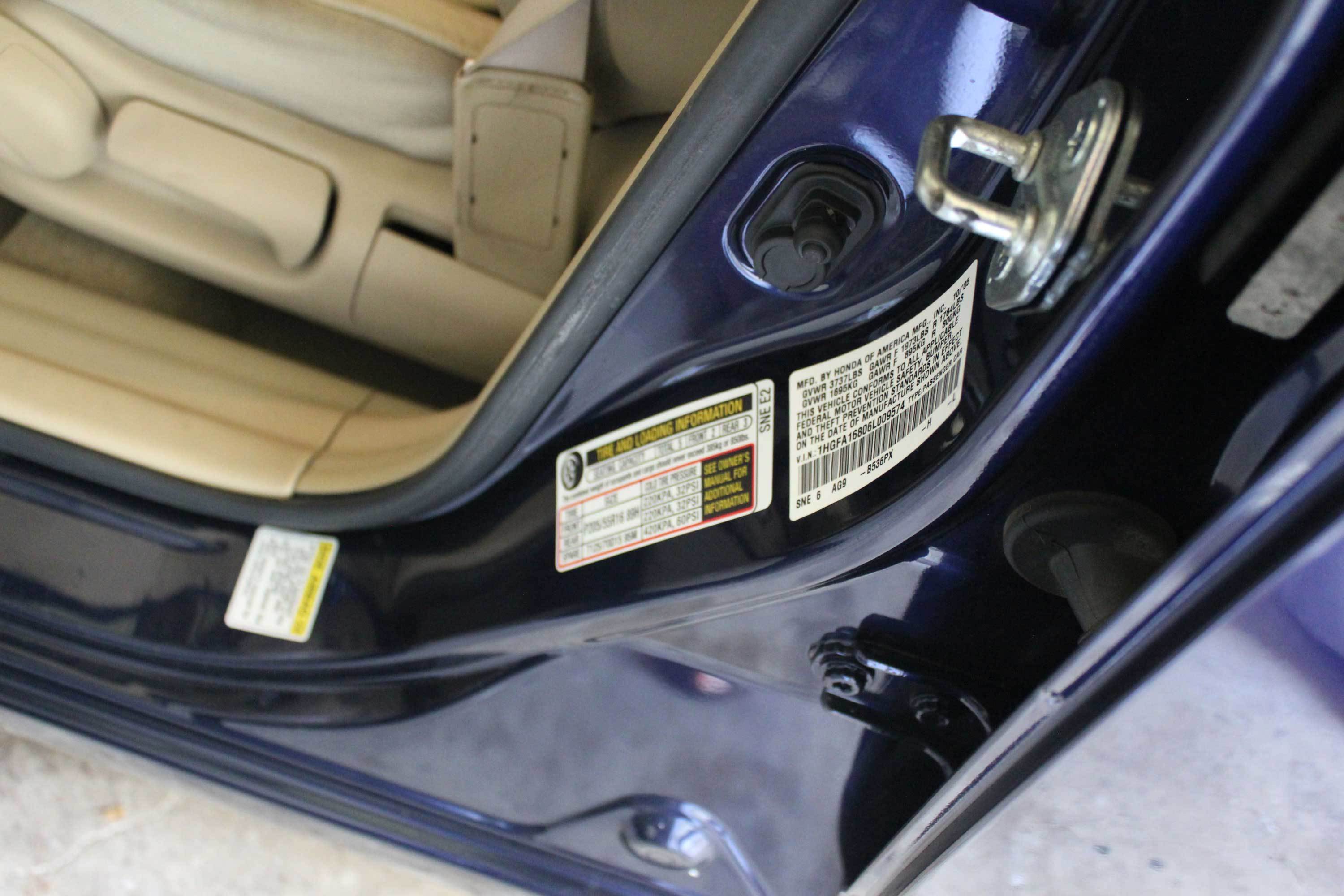
Tire pressure sticker on inside door panel
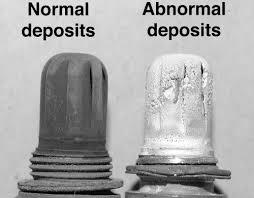
Carbon deposits on lambda probe
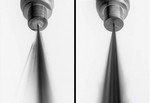
Fuel Injector: Weak spray vs strong spray
Driving too fast:
It's a well known fact from physics that the faster an object travels, the bigger the air resistance is. Going fast requires a lot of force and force requires gas. Each car has an economic cruising speed where it has the most efficient fuel consumption. Most of the time this speed interval is between 68 mph and 80 mph. Old school knowledge says that if your speedometer is in a straight up position, you're in the economic cruising zone. For almost all models this speed is around 60 mph.
Broken thermostat:
The thermostat is the trigger that let's the engine know what temperature your cooling agent sits at. And triggers at the right moment (around 175-195 F) to allow coolant to flow into the engine from the radiator. When it malfunctions it will either be stuck on "open" and let the coolant run the circuit all the time or stuck on "closed" and have your engine boil over. If it's stuck on "open", your engine will not be able to warm up to the operating temperatures and it will result in unburnt fuel.
Misfires:
If an engine misfires due to any reason, big amounts of fuel are wasted. Misfires can appear due to ignition issues such as:
- worn spark plugs
- wrong spark plugs
- worn out ignition coils
- malfunctioning or clogged fuel injectors or simply low fuel pressure.
Clogged fuel injectors:
Inside the injectors, small deposits can form that will block the normal spray pattern of the fuel. Blockages like this will push the debit and pressure outside the range requested by the car's computer. Same as the oxygen sensor, this issue leads to misfires and abnormal fuel consumption.
Wrong oil viscosity:
Each engine manufacturer requires a different oil to be used in their engines. Some of the most recent cars require a low viscosity oil such as 5w20 or 5w30 or even 0w20. These types of oils enhance fuel economy especially in winter time when the oil tends to get thicker. If the engine is being added a higher viscosity oil than recommended , the force needed to move the pistons and crankshaft is raised. Fuel consumption will be influenced and will be 5-10% higher.
Locked up brakes:
A hand brake or a brake caliper that does not fully disengage will make your car work harder to get moving. Such stress on the engine increases fuel consumption.
After carburetors were phased out, cars started to become equipped with fuel injectors regardless of the engine fuel type. We've gone from a simple, mechanical injection and single point injection all the way to multi-point injection or common-rail injection. Injectors suffered a lot of enhancements but in general remained the same components in charge of spraying the fuel in the combustion chamber. Depending on how well it sprays, overall performance and gas mileage are influenced.
Issues with fuel injectors are rather easy to spot as all cars display a warning in the dashboard as soon as any issue is caught by the car's computer. If the dashboard is not showing any issue, one can tell if the car has injection problems by the way the car runs. The car can stop running smoothly, vibrate more when idling, have low performance or have an increase in fuel consumption and in extreme situations when a fuel injector is blocked, serious engine stutter occurs.
When a fuel injector is getting clogged we can feel that the car is not running as freely, as if something is blocking the flow of power when pushing the gas pedal. Some of the times, an injector might not work when the car is idling but start to work at high rpm's or when the car is travelling at a high speed. This is due to the higher pressure and flow of fuel through the injector. Once clogging gets very severe the engine will start to suffer from the following:
Stutter
Lack of gas creates an improper air/fuel mixture causing the combustion inside the cylinders to be very weak. This makes the engine unable to generate the power needed to properly accelerate and deploy power to the wheels.
Misfire
Having an improper air/fuel mixture can cause an incomplete combustion and the cylinder can miss a stroke. Cylinder strokes are designed to be perfectly synchronized and having a missed stroke will badly influence the whole engine causing a noticeable sound and immediate engine power loss. In more severe cases the driver will start to feel a jerking sensation coming from the powertrain or the engine.
Rough idling or engine stalling
When the supply of fuel is not constant the engine RPM's will fluctuate wildly. At idle, rpm's can fall to low and stall the engine.
Increase in emissions
Since the combustion is inefficient the fuel is burned just partially. This badly affects emissions and could have your car fail the emissions test.
Increase in fuel consumption
Having the efficiency of the fuel combustion negatively affected, the engine will need much more fuel to generate the level of power it usually did. Depending on the severity of the clogging you can see upwards to 70% increase in consumption.
**Turbocharged engines alert! - If your vehicle uses a turbocharged engine and you start to develop fuel injection clogging be aware that you are placing the risk of uncontrolled damaging detonation resulted from the overly lean condition of running. This sensibility is given by the fact that these engines reach high rpm's and require a more accurate fuel dispersion rate than other types of engines.
Overall
As technology improves, new iterations of fuel injectors appear, each more powerful, precise and also sensitive.
The clogging phenomena tends to appear more and more often because of the fuel quality at the pump. Fuel unfortunately is low quality most of the times, containing impurities and less cleaning additives than it should.
Under normal running conditions, low quality fuel leaves behind some residue when it's sprayed into the combustion chamber and by default does not burn perfectly at detonation. These two factors combined create a deposit on the fuel injector. At first it forms a slight layer over the injector which does not influence much, however as time passes and more fuel is burned, the deposits start to build up and affect the spray pattern of the injector all the way to fully clogging it.
The reason why early stages of clogging are not easy to spot is because of the computers and sensors of modern engines. These adjust the fuel mixture in order to compensate for minor errors and it does it so well that problems tend to go unnoticed for a longer time.
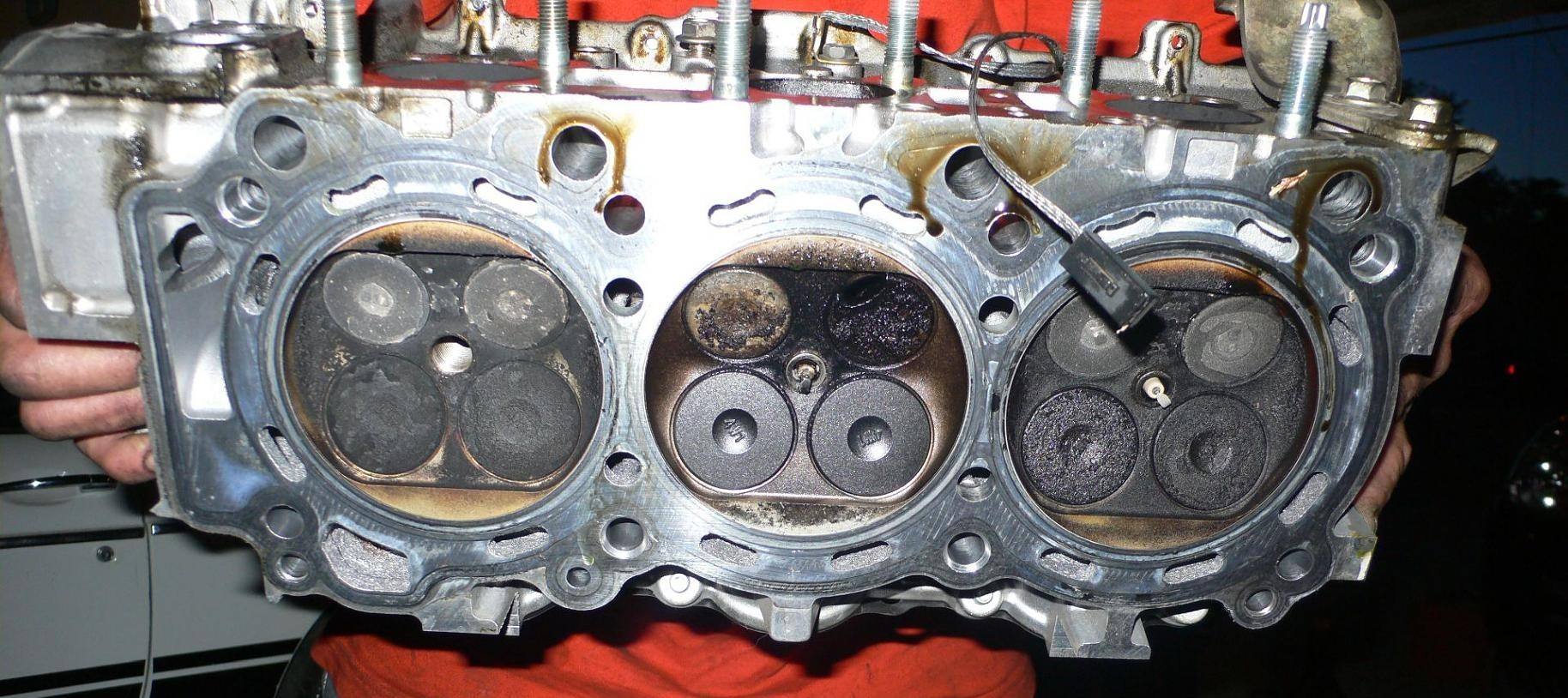
Worn valve by running with a faulty air/fuel ratio and misfire
More miles, less gas. More fun, less spend... isn't this the auto nirvana we're all searching for?
Thankfully decreasing fuel consumption is possible. People have worked hard to create and test different methods to obtain a boost in MPG. Some yield great results, others not so. We've gathered 5 tips on how to decrease fuel consumption for you:
1. Pedal feathering
We all have the tendency to let the speed demon out from our inner beings and become an F1 racer every now and then. Leaving the stoplight first, blitzing to 60 or above feels so great, together with hitting a few apex's at just the right maximum speed it can support, makes the drive so much more fun...heck, even needing to brake hard at the stop light because you couldn't manage to squeeze by on yellow is not something that angers many drivers. Regrettably, besides some fun and joy, this route will always deliver high fuel consumption too.
Studies have been made and the conclusion is that aggressive driving makes us pay extra anywhere from a quarter to a full dollar per each gallon of fuel burned.
How to avoid it?
If you want to decrease fuel consumption, just use the car normally. By accelerating easily when leaving an intersection to let the engine rev up and speed up at it's own pace. Also using your engine's stopping power and leaving enough space in front of you to brake fluidly and easily will also help. Trick is to handle your vehicle with grace and smoothness.
2. Using the right fuel
Word on the street is that using premium gas will yield you the best performance from your vehicle.
As straightforward as it sounds, the sad truth is that it depends. It depends on the car that you drive. Each car manufacturer strives to create the perfect tune that will allow the user to experience good power, good emission levels and also great mileage. This is why each car usually comes with either a sticker on the gas cap or with info in the owner's manual about the type of fuel recommended by the manufacturer.
The recommended type of fuel is the one that was tested and yielded the best results. Over three quarters of the worlds vehicles run perfectly on regular, cheap fuel and just a part have high-performance, high compression engines that can run properly only on premium fuel. Putting premium, expensive fuel into your regular fuel car does absolutely nothing but run up your bill and indirectly your fuel consumption (from a monetary value, as MPG stays the same).
3. Driving in the highest gear possible
Perhaps it sounds weird, however the logic behind this is great. On a manual you should always use the highest gear possible correlated with the average speed your're going. Key point is to not put unnecessary load on your engine. This will decrease fuel consumption on the long run.
For example you might be used to do 40 mph in 3rd gear... however your car might be able to perfectly do that in 5th. This would enable you to save 25% of the fuel your engine normally uses under these circumstances. Vice-versa, running high speeds on low gear can increase your consumption by as much as 45% vs. regular consumption in that circumstance. Logic behind it is that the engine does not have to work so much in a higher gear to run at your desired speed. If you're driving a manual, always keep this in mind! If you're driving automatic then you just need to make sure you're easy on the gas pedal.
4. Using cruise control
On a long road we have the tendency to match the speed of the traffic participants in front of us and most of the time, this person is not driving consistently. Using cruise control will help maintain a constant speed and be fuel efficient as the lack of need to accelerate or brake often will significantly (positively) impact your fuel economy. The only exception to this rule is if you have a lot of hills to negotiate, and you're more of a throttle feathering ninja, then you can squeeze even more fuel efficiency out of your rig vs. just letting the cruise control manage the hills for you.
5. Using fuel additives
These highly researched and tested formulas help decrease fuel consumption in different ways. On the market you will find octane boosters that will help boost your fuel's octane figures and enable your fuel to generate more power per each gallon, but only on a required load... meaning if you're towing or if you're not able to buy the recommended fuel type. More power means less effort from the engine to move the vehicle.
Also you will find formulas designed to maximize performance and also keep fuel injectors clean. These cover all the needs to ensure your engine is kept in top condition and that consumption is as low as possible. This type of additive contains polyetheramine (PEA), a chemical designed to attach to the carbon deposits and dissolve them, enabling the fuel system to "safely wash"away the residues. If you'd like to read and know more about the types of Fuel Additives out there, click here!
A great, cost effective way to obtain the desires results
(shameless plug here as we really like the following recommendation) would be CleanBoost® Maxx™ . This is formulated to eliminate carbon deposits and also remove all the harmful elements that can lead to its appearance .
Also it contains a unique formula and a proprietary combustion catalyst that besides keeping carbon deposits under control, also improves your engine's MPG and power.
Feel free to learn more about CleanBoost® Maxx™ and discover how a small investment of a few cents per gallon, which actually saves you money with improved performance, gas mileage and carbon deposit elimination, will end up being profitable when you factor in the overall longevity of your investment.
Follow these tips and take care of your engine so you can get the desired boost in MPG. Say goodbye to runaway fuel consumption anxiety and embrace quality time with your fuel powered friend.
About the Author
Tech Guy
Automotive enthusiast, passionate about Jeeps, hot-rods, turbos, performance, efficiency, diesels, fuels, high performance oils, additives and anything with an engine.

